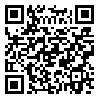Volume 14, Issue 2 (10-2024)
Clin Exc 2024, 14(2): 102-116 |
Back to browse issues page
Download citation:
BibTeX | RIS | EndNote | Medlars | ProCite | Reference Manager | RefWorks
Send citation to:



BibTeX | RIS | EndNote | Medlars | ProCite | Reference Manager | RefWorks
Send citation to:
Bagherian S P, Mirhashemian M, Davari R. Internet Addiction Modeling Based on Personality Traits and Parent-Child Relationship with Emotional Intelligence Mediation in Adolescents. Clin Exc 2024; 14 (2) :102-116
URL: http://ce.mazums.ac.ir/article-1-852-en.html
URL: http://ce.mazums.ac.ir/article-1-852-en.html
Department of Psychology, Roudhen branch of Islamic Azad University, Roudhen, Iran
Abstract: (2272 Views)
Background and purpose: When studying the history of technology, the internet has shown the fastest growth rate, deeply impacting individuals' lives. Internet addiction is one of the fundamental issues that requires further investigation and research. The aim of the present study was to design and test a model of Internet addiction among adolescent students (middle school and junior high school) in Tehran. In the proposed model, NEO personality traits and parent-child relationships were considered exogenous variables, emotional intelligence as a mediating variable, and Internet addiction as the endogenous variable.
Materials and Methods: The present descriptive research was conducted using the structural equation modeling (SEM) method. To test the proposed research model, 360 students (151 boys, 209 girls) were randomly selected through multistage cluster sampling from all middle school students in Tehran during the 2022-2023 academic year. The participants responded to the NEO Personality Inventory-Short Form, the Parent-Child Relationship Scale by Fine et al., the Emotional Intelligence Scale by Schutte et al., and Young’s Internet Addiction Test. Structural equation modeling, using Anderson and Gerbing's two-step approach, was employed to test the research model. Additionally, the Bootstrap method in the Amos software was used to examine the significance of the indirect effects in the research model.
Results: The results of the model test indicated that the fit indices for the research model were within an acceptable range. Furthermore, personality traits (neuroticism, openness to experience, extraversion, agreeableness, conscientiousness) and parent-child relationships were found to have both direct and indirect relationships with internet addiction in adolescents (students).
Conclusion: In terms of internet addiction among students, it is necessary to consider personality traits, parent-child relationships, and emotional intelligence.
Materials and Methods: The present descriptive research was conducted using the structural equation modeling (SEM) method. To test the proposed research model, 360 students (151 boys, 209 girls) were randomly selected through multistage cluster sampling from all middle school students in Tehran during the 2022-2023 academic year. The participants responded to the NEO Personality Inventory-Short Form, the Parent-Child Relationship Scale by Fine et al., the Emotional Intelligence Scale by Schutte et al., and Young’s Internet Addiction Test. Structural equation modeling, using Anderson and Gerbing's two-step approach, was employed to test the research model. Additionally, the Bootstrap method in the Amos software was used to examine the significance of the indirect effects in the research model.
Results: The results of the model test indicated that the fit indices for the research model were within an acceptable range. Furthermore, personality traits (neuroticism, openness to experience, extraversion, agreeableness, conscientiousness) and parent-child relationships were found to have both direct and indirect relationships with internet addiction in adolescents (students).
Conclusion: In terms of internet addiction among students, it is necessary to consider personality traits, parent-child relationships, and emotional intelligence.
Keywords: Adolescent, Conscientiousness, Emotional Intelligence, Extraversion, Internet Addiction Disorder, Parent-child Relationship.
Type of Study: case report |
Subject:
روانشناسی
Received: 2024/05/12 | Accepted: 2024/09/16 | Published: 2024/09/16
Received: 2024/05/12 | Accepted: 2024/09/16 | Published: 2024/09/16
Send email to the article author
| Rights and permissions | |
 |
This work is licensed under a Creative Commons Attribution-NonCommercial 4.0 International License. |






